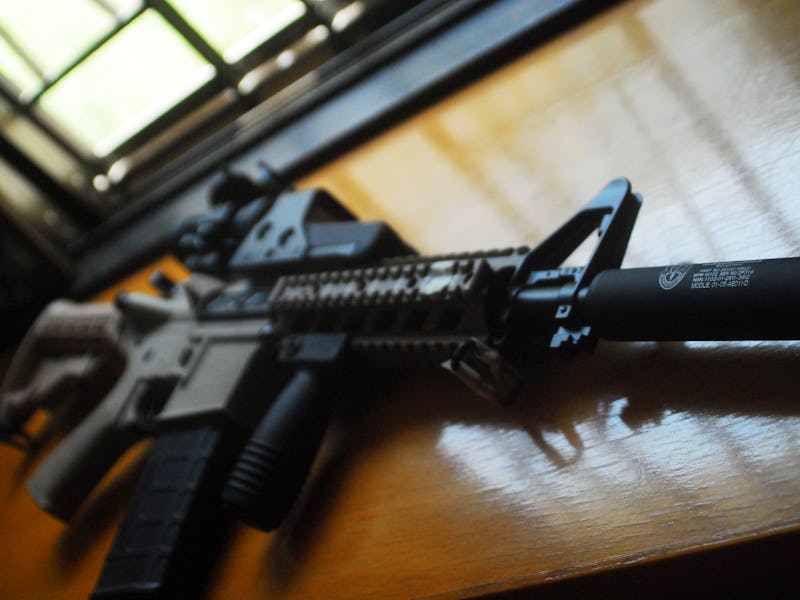Gun Advocates Argue Silencer Law Will Fight 'Public Health Crisis'
Pro-firearms laws are moving through Congress in the wake of tragedy.

The deadliest mass shooting in United States history occurred Sunday night in Las Vegas, a tragedy that has so far resulted in 58 deaths. Yet, while Americans struggle to comprehend what role guns even have in their country, two pieces of pro-gun legislation are on their way to becoming law in Washington. One, the Concealed Carry Reciprocity Act of 2017, would allow permit-carrying gun owners to bring their weapons over state lines. The other, known as the Hearing Protection Act, would make it easier for people to purchase silencers.
The latter is especially pertinent in wake of the Las Vegas shooting. After the attack, Hillary Clinton referenced the Hearing Protection Act in a tweet in which she argued that there would have been even more deaths if the shooter had used a silencer. This stands counter to the arguments consistently made by supporters of the bill, who use studies to claim that silencers are just a means to better public health and don’t actually make guns that silent.
There’s public health and medical research addressing both the detrimental effects of gunshots on human hearing and different ways to prevent them. The question that this research does not address, however, is whether noise-making is really the gun issue in America that needs to be addressed.
The Hearing Protection Act, which was originally proposed in January and is expected to pass sometime this week, is being framed as public health service meant to protect the hearing of Americans who use guns. If it passes, the bill, which is under the umbrella of the SHARE Act, would override the National Firearms Act of 1934 that requires people who wish to purchase a silencer to federally register, have a specific license, and pay a $200 tax. Under the new law, people who purchased a silencer after October 2015 would receive a refund for that tax, and background checks would not be required. Drafted by Representatives Jeff Duncan of South Carolina and John Carter of Texas, the bill’s original hearing was scheduled for June 14 but was postponed because that was the same day that House Majority Whip Steve Scalise was shot during practice for the congressional baseball game.
In a press release for the bill, Duncan references his own gun-caused hearing damage as an example of the good that silencers could do, while Carter says “suppressors do not make guns silent or dangerous, they are simply a form of hearing protection, both for the shooter and their hunting dogs.”
Gun advocates argue that silencers are a boon for public health.
NRA-affiliated publications regularly reference a 2017 study published in Laryngoscope by researchers from the University of California, Irvine and Harvard Medical School arguing that “chronic high-intensity noise and intense impulse noise can have detrimental effects on human hearing.” However, the study also showed that, of the 36.6 percent of American adults who have a lifetime of firearm noise exposure, only 58.5 percent use hearing protection — that’s approximately 7.4 million Americans who don’t protect their hearing around firearm shooting.
It’s scientifically well known that repeated exposure to sounds above 140 decibels can cause high-frequency permanent hearing loss, and nearly all firearms can surpass this level. A small .22 caliber gun, for example, can produce a noise at 140 decibels, and big-bore rifles and pistols can create sounds over 175 decibels.
The Laryngoscope study only assesses the potential of hearing damage caused by a lack of hearing protection — not by a lack of silencers, specifically. A wide variety of hearing protection is available for gun users, but many users, especially hunters, choose not to use them for various reasons, like wanting to hear backcountry prey or potential perpetrators.
“It’s about — I don’t have to wear hearing protection while I shoot; I don’t have to damage my ears,” Jason Schauble, chief revenue officer at SilencerCo, a manufacturer of firearm silencers, told NPR in a discussion over the Hearing Protection Act in March. “So we think of it as a public health issue.”
An assault rifle with a silencer.
Gun regulation advocates call bogus on the gun advocates’ public health claim, arguing that the Hearing Protection Act is about bringing more cash into the gun industry than protecting health.
The most important query, however, is not a question for public health experts or scientists but for the U.S. government: Why is Congress debating whether silencers should be easier to obtain when they should be figuring out how to keep thousands of Americans from being murdered by guns?
“There’s no evidence of a public health issue associated with hearing loss from gunfire,” Kristin Brown of the Brady Campaign to Prevent Gun Violence told the Los Angeles Times on Monday. “There is evidence of a public health crisis from gun violence, and we think that’s where legislative efforts should be directed.”